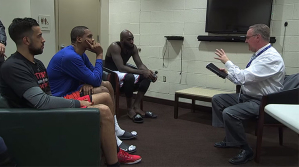
Pastor John Love held an impromptu chapel session with Toronto Raptors player Landry Fields, and New York Knicks' Lance Thomas and Quincy Acy on Saturday.
The Gospel Herald video showed the pastor leading the NBA players in a word of prayer. Love, the chaplain hired by the New York Knicks who holds pregame chapel sessions, first turned to explaining parts of the Old Testament.
"In certain parts of the Old Testament, I don't know about you, but if you ever come across a genealogy in the Bible, there's probably nothing more boring that you'll ever read in your entire life," Love said. "The one thing that clearly is missing in the Old Testament is that are no women's names mentioned."
The chaplain explained the historical context behind why women's names were left out in the Old Testament.
"In Old Testament times, they didn't matter. They were not important," Love said. "The intelligent genealogists would obviously leave their names out."
Love then explained that the New Testament took a wildly different approach, most particularly on the genealogy of Jesus.
"Think about Christ. He did not sin," Love said about Jesus, citing Hebrews 7. "He never had a thought that was unworthy of God. He never did anything that was unworthy of God. He was the sinless, spotless Lamb of God, the only one who was fitting and willing to be a substitute for you and I."
Love explained how the genealogy of Jesus contained imperfect people.
"In His genealogy, there was some messed up monarchs," Love said. "There were some battling brothers. There were some people in this family line that if you knew them, if you were related to them, you wouldn't tell anybody. That's how bad they were."
The Knicks chaplain then noted that four women's names were mentioned in the genealogy of Jesus, which was almost unheard of during those times.
"The discreet genealogist would leave out their names and not include them," Love said. "The first one was Tamar; she was an adulteress. Rahab, she was famous in the Bible because she was a prostitute."
Love added that Rahab hid the spies in Jericho, an action that would allow the Israelites under Joshua to take over the Promised Land. He then turned his focus to the other two women in Jesus' bloodline.
"Ruth was a Moabite, a sworn enemy of the nation of Israel," Love said. "She's in there, a stranger to the Commonwealth of Israel. What is she doing in there?"
According to Love, the final woman present in the genealogy of Jesus was Bathsheba, a woman that David committed adultery with; the king later had Bathsheba's husband, Uriah the Hittite, killed in battle as a cover-up that God later found out and punished him.
Love then proceeded to make his overall point about the four women present in Jesus' bloodline.
"My point is this: four women whose names should not have been in there, but yet at the same time they were people," Love said. "They're people that should be forgotten. Nobody cares about them."
However, Love noted that Jesus added them to His bloodline anyway.
"He puts them in his own genealogy," Love said. "Why? Because the friend of sinners wants everybody to know that He is not ashamed to take even the greatest of sinners into the nearest possible relationship to Himself. That's what He wants us to know."
The pastor then honed in on the overall point God was trying to make to everyone.
"God wants us to know that we are never so far down the road that he's not going to come after us," Love said. "We are not so messed up that He's going to say, 'Sorry, I'm going to quit on you. I have to get someone new.' He does not do that."
Love brought up a question from someone of what would happen if a Christian fell from their faith.
"When a Christian falls, he falls into the everlasting arms of God," Love said, citing Deuteronomy 33:27. "And underneath are the everlasting arms."
Love added that God's arms "are ready to catch His fallen children," including imperfect people.
"He refuses to give up on them," Love said. "Why? Because that's the kind of God He is."
Love cited other examples of imperfect people in the Bible, including Abraham, Issac and Jacob.
"No matter what the world does to you, they might cast you out and call you unworthy," Love said. "If the world doesn't do it, sooner or later the church will do it to you."
Before closing in prayer, Love concluded his chapel session with a hopeful message.
"You're good enough to be part of God's family, and He's never ever going to turn His back on us," Love said. "He's committed Himself to us. If you don't think so, just ask these four women."






